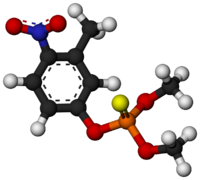撲滅松
外觀
此條目翻譯品質不佳。 (2023年3月31日) |
本條目可能存在過多偏好某個特定立場的論點。 (2018年8月1日) |
| 撲滅松 | |
|---|---|

| |

| |
| IUPAC名 O,O-Dimethyl O-(3-methyl-4-nitrophenyl) phosphorothioate O,O-二甲基-O-(3-甲基-4-硝基苯基)硫代磷酸酯 | |
| 別名 | Dimethoxy-(3-methyl-4-nitrophenoxy)thioxophosphorane O,O-Dimethyl O-4-nitro-m-tolyl phosphorothioate |
| 識別 | |
| CAS號 | 122-14-5 |
| PubChem | 31200 |
| ChemSpider | 28941 |
| SMILES |
|
| InChI |
|
| InChIKey | ZNOLGFHPUIJIMJ-UHFFFAOYAZ |
| ChEBI | 34757 |
| KEGG | C14442 |
| 性質 | |
| 化學式 | C9H12NO5PS |
| 摩爾質量 | 277.23 g·mol−1 |
| 外觀 | 黃棕色液體 |
| 密度 | 1.3227 g/cm3 |
| 熔點 | 3.4 °C(277 K) |
| 沸點 | 118 °C(391 K) |
| 溶解性(水) | 38.0 mg/L |
| 溶解性 | 易溶於二氯甲烷、異丙醇、甲苯,難溶於正己烷[1] |
| log P | 3.30(辛醇/水)[2] |
| 危險性 | |
| 致死量或濃度: | |
LD50(中位劑量)
|
500 mg/kg(大鼠,口服)[3] 1416 mg/kg(雌性小鼠,口服)[4] |
| 若非註明,所有數據均出自標準狀態(25 ℃,100 kPa)下。 | |
撲滅松(英語:Phenitrothion)是一種價格低廉且在世界範圍內廣泛使用的硫代磷酸酯(有機磷酸酯)殺蟲劑。[5]
健康影響
[編輯]低於致死劑量的撲滅松會影響有袋動物的動作機能,[6]而在急性(高)劑量水平下,它會降低鳥類的運動活力。 [7]
在慢性(低)劑量試驗中,出乎意料的是,只有最低濃度(0.011 微克/升)的殺螟松抑制了藻類的生長,儘管所使用的所有慢性劑量水平在其他方面對藻類都是有毒的。 [8]
撲滅松只需要一半的最低有效劑量就可以改變淡水線鱧(鮕鮐)的甲狀腺結構。 [9]
生活在撲滅松噴霧操作附近的兒童的非特異性腦病和脂肪內臟變化(雷氏症候群)病例引發了後來在《科學》、[10]和最初在《柳葉刀》中描述的研究: [11]
| “ | 2日大的小鼠11日中每日服用撲滅松還有其他物質。在之後2天皮下注射固定且低於致死劑量的腦心肌炎病毒 。在注入病毒後,小鼠死亡率在服用撲滅松組別中死亡率為4-9%,而在服用玉米油對照組中死亡率為0%。在服用撲滅松-腦心肌炎病毒組別中發現小鼠在肝臟和腎臟中脂肪出現變化。其中死亡小鼠發現其腦病變並未出現於特定中央神經系統中,但在一系列的癱瘓和驚厥後小鼠才有死亡情形。撲滅松-腦心肌炎病毒組合對於人類病毒易感性的潛在接觸角色需要更多關注。 | ” |
進一步的研究表明,這種疾病不是由撲滅松本身引起的,而是包括表面活性劑和溶劑(有或沒有殺蟲劑)在內的組合清楚地表明,用這些化學物質進行預處理顯著增加了試驗小鼠的病毒致死率。[12]
昆蟲對其的抗藥性
[編輯]在一個不尋常的對殺蟲劑抗性的證明中,農田中 8% 的昆蟲被發現攜帶一種可以代謝和解毒殺螟松的共生腸道微生物;經過體外試驗表明,該微生物顯著提高了撲滅松處理的昆蟲的存活率。 [13]
參考資料
[編輯]- ^ Farm Chemicals Handbook. Willoughby, OH: Meister Publishing Co. 1999: 177. ISBN 978-1-892829-02-3. OCLC 50201739.
- ^ Hansch C, Leo A, Hoekman D. Exploring QSAR - Hydrophobic, Electronic, and Steric Constants.. Washington, DC: American Chemical Society. 1995: 60. ISBN 978-0-8412-2993-8. OCLC 924843801.
- ^ Eckroth D, Grayson M, Kirk RE, Othmer DF. Kirk-Othmer Encyclopedia of Chemical Technology. 3 3rd. New York, NY: John Wiley and Sons. 1981: 440. ISBN 978-0-471-02066-0. OCLC 873939596.
- ^ Sekizawa J, Eto M, Miyamoto J, Matsuo M. Environ Health Criteria 133: Fenitrothion (報告). Geneva: World Health Organization: 70. 1992 [2022-10-28]. (原始內容存檔於2022-10-28).
- ^ 杀螟松 | 122-14-5. www.chemicalbook.com. [2022-10-28]. (原始內容存檔於2022-10-28).
- ^ Buttemer WA, Story PG, Fildes KJ, Baudinette RV, Astheimer LB. Fenitrothion, an organophosphate, affects running endurance but not aerobic capacity in fat-tailed dunnarts (Sminthopsis crassicaudata). Chemosphere. July 2008, 72 (9): 1315–20. Bibcode:2008Chmsp..72.1315B. PMID 18547601. doi:10.1016/j.chemosphere.2008.04.054.
- ^ Kitulagodage M, Isanhart J, Buttemer WA, Hooper MJ, Astheimer LB. Fipronil toxicity in northern bobwhite quail Colinus virginianus: reduced feeding behaviour and sulfone metabolite formation. Chemosphere. April 2011, 83 (4): 524–30. Bibcode:2011Chmsp..83..524K. PMID 21227481. doi:10.1016/j.chemosphere.2010.12.057.
- ^ Ferrando MD, Sancho E, Andreu-Moliner E. Chronic toxicity of fenitrothion to an algae (Nannochloris oculata), a rotifer (Brachionus calyciflorus), and the cladoceran (Daphnia magna). Ecotoxicology and Environmental Safety. November 1996, 35 (2): 112–20. PMID 8950533. doi:10.1006/eesa.1996.0090.
- ^ Saxena PK, Mani K. Effect of safe concentrations of some pesticides on thyroid in the freshwater murrel, Channa punctatus: a histopathological study. Environmental Pollution. 1988, 55 (2): 97–105. PMID 15092506. doi:10.1016/0269-7491(88)90121-2.
- ^ Crocker JF, Ozere RL, Safe SH, Digout SC, Rozee KR, Hutzinger O. Lethal interaction of ubiquitous insecticide carriers with virus. Science. June 1976, 192 (4246): 1351–3. Bibcode:1976Sci...192.1351C. PMID 179146. doi:10.1126/science.179146.
- ^ Crocker JF, Rozee KR, Ozere RL, Digout SC, Hutzinger O. Insecticide and viral interaction as a cause of fatty visceral changes and encephalopathy in the mouse. Lancet. July 1974, 2 (7871): 22–4. PMID 4134409. doi:10.1016/S0140-6736(74)91351-8.
- ^ Safe S, Plugge H, Crocker JF. Analysis of an aromatic solvent used in a forest spray program. Chemosphere. 1977, 6 (10): 641–651. Bibcode:1977Chmsp...6..641S. doi:10.1016/0045-6535(77)90075-3.
- ^ Kikuchi Y, Hayatsu M, Hosokawa T, Nagayama A, Tago K, Fukatsu T. Symbiont-mediated insecticide resistance. Proceedings of the National Academy of Sciences of the United States of America. May 2012, 109 (22): 8618–22. Bibcode:2012PNAS..109.8618K. PMC 3365206
 . PMID 22529384. doi:10.1073/pnas.1200231109
. PMID 22529384. doi:10.1073/pnas.1200231109  .
.
